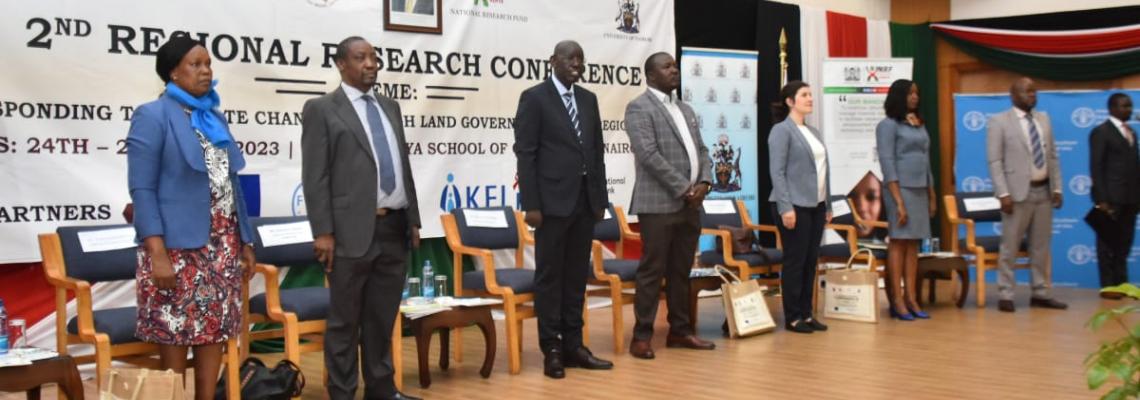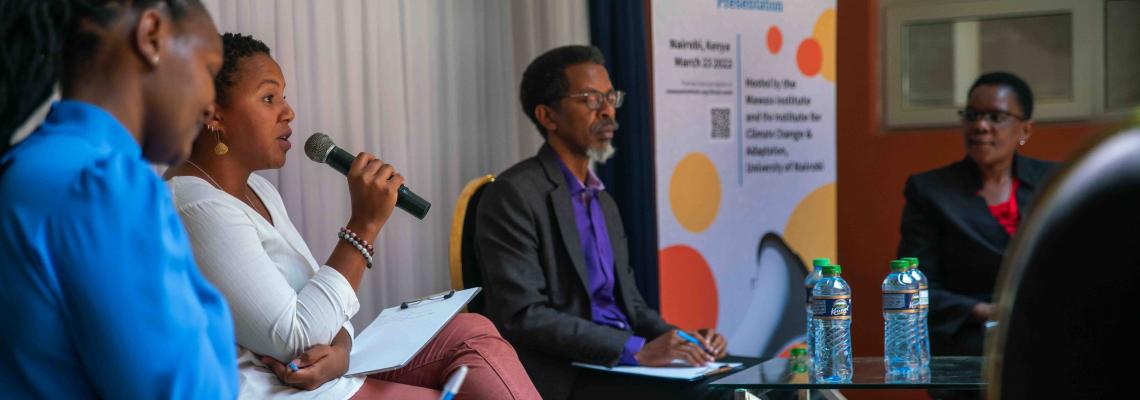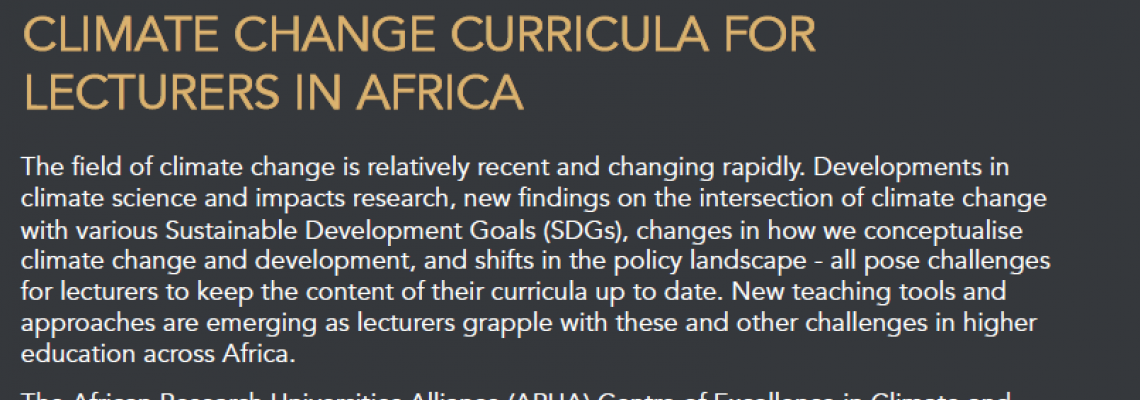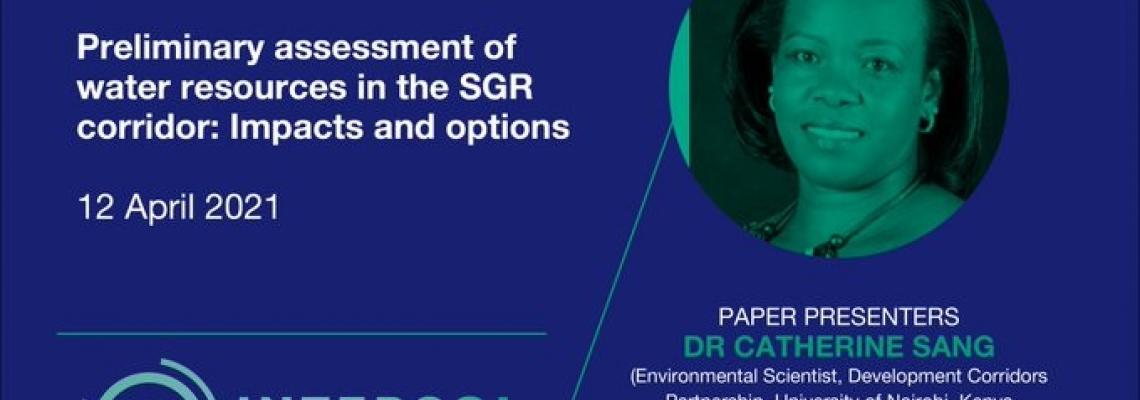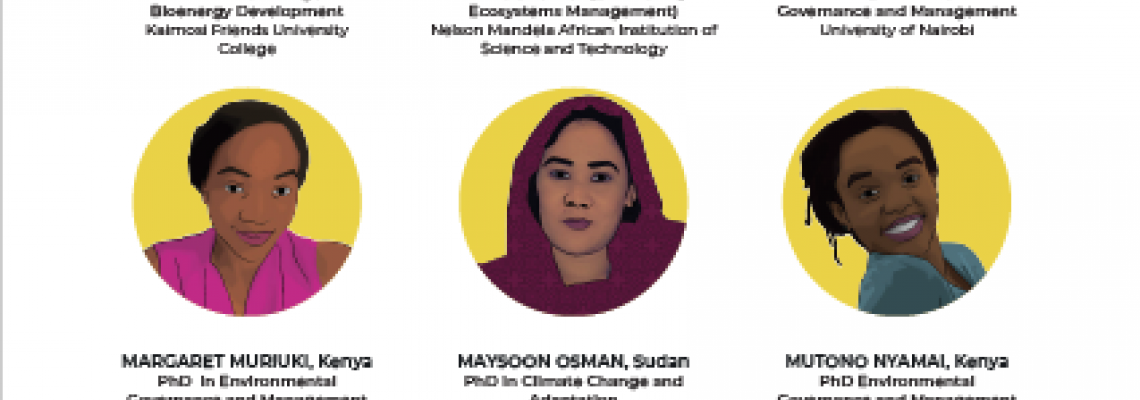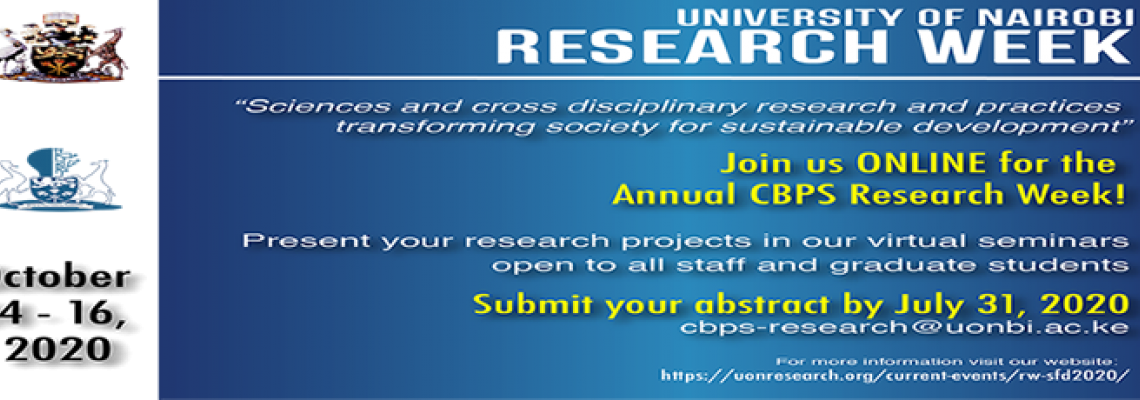Overview
The Doctor of Philosophy in Climate Change and Adaptation programme of the University of Nairobi seeks to impart the science and practice of climate change and adaptation. It explores the fundamental changes caused by anthropogenic and natural activities that influence the alteration of the living earth’s environment.
a) Impart trans-disciplinary knowledge required to address climate change and adaptation issues that meet the unique needs of African societies.
b) Enhance the ability of candidates to engage in action-oriented and trans-disciplinary research activities that will help improve climate change and adaptation capacity in Africa.
c) Equip the candidates with skills for managing risks posed by climate change at global, regional, national and community levels.
d) Provide candidates with decision support tools for sound advice to policy and decision makers
Structure
1 An applicant who qualifies for admission shall be deemed to have satisfied the requirements spelt out in the Common Regulations for the Degree of Doctor of Philosophy of the University of Nairobi.
2 The programme comprises of PhD by Thesis plus four prerequisite courses.
3 A successful applicant shall register as a doctoral candidate and take the required courses. Candidates may embark upon their Thesis only after successful completion of the prerequisite courses.
4 The proposal for PhD registration will be written under a minimum of two approved supervisors. The candidate will present the research proposal at a seminar and the recommendations made shall be incorporated into the proposal before submission by the Chairman of the Institute's Postgraduate Studies Committee to the Board of Postgraduate Studies (BPS) for registration.
5 Upon successful registration for the PhD degree, the candidate shall start their research under the mentorship of the joint supervisors for a period of not less than eighteen (18) months.
6 The maximum duration for the programme shall be ten (10) semesters for full time candidates and fourteen (14) semesters for part-time candidates. This includes prerequisite courses, examinations, seminars, and thesis.
7 Mode of Delivery The programme is offered through a face-to-face mode of delivery, trans-disciplinary approaches, community outreach projects using participatory methodologies, webinars (online seminars),and teleconferencing; each course unit shall be taught for forty-five (45) contact hours.
Recent COVID 19 Challenges has seen the mode of delivery change to online. This reduces physical contact and keeps the students and lecturers safe.
8 Candidates registered for PhD degree shall carry out research and produce a Thesis. The research shall commence in the semester immediately after successful completion of courses and registration. Once the research work has started, it must be completed in a period not less than eighteen (18) months. Candidates will be required to make an oral defence on completion of the Thesis.
Admission Requirements
Admission for the programme is carried out annually in September. Applications are processed on a rolling basis.
The common regulations governing admission into PhD programmes in all Institutes, Faculties, Schools and Centres of the University of Nairobi shall apply.
The following shall be eligible for admission in the PhD programme in Climate Change and Adaptation:
a) A holder of a Masters’ degree in climate change and adaptation or equivalent from the University of Nairobi or any other institution recognised by the Senate.
b) A holder of a doctoral degree from the University of Nairobi or any other institution recognised by the Senate.
c) Applicants with a Master’s degree other than in climate change and adaptation will be considered for admission on the basis of their transcript and climate change and adaptation-related professional experience.
For queries kindly contact
Institute for Climate Change and Adaptation
icca@uonbi.ac.ke
Telephone +254(0)204914305/4307
Careers
Graduates of this programme will find employment in national government ministries, private sector enterprises, non-governmental organizations and the United Nations organizations. They will also be green business and technology entrepreneurs.
The Administration office at the institute circulates fellowship and scholarship opportunities for students regularly
DVC RIE's office also regularly circulates scholarship and fellowship opportunities
Fees and Funding
| DOCTOR OF PHILOSOPHY IN CLIMATE CHANGE AND ADAPTATION - I85 | ||||
| YEAR 1 | YEAR 2 | YEAR 3 | TOTALS | |
| TUITION | 396,000 | 396,000 | 396,000 | 1,188,000 |
| EXAMINATION (PER UNIT @1000) | 4,000 | 0 | 0 | 4,000 |
| ICT SERVICES - (PER YEAR) | 7,000 | 7,000 | 7,000 | 21,000 |
| REGISTRATION (PER SEMESTER@2250) | 4,500 | 4,500 | 4,500 | 13,500 |
| ID CARD ( PER YEAR) | 1,000 | 1,000 | 1,000 | 3,000 |
| CAUTION - (ONCE) | 5,000 | 0 | 5,000 | |
| MEDICAL FEE (PER YEAR) | 6,500 | 6,500 | 6,500 | 19,500 |
| LIBRARY (PER YEAR) | 5,000 | 5,000 | 5,000 | 15,000 |
| ACTIVITY-( PER YEAR) | 2,000 | 2,000 | 2,000 | 6,000 |
| STUDENT ORGANISATION(PER YEAR) | 1,000 | 1,000 | 1,000 | 3,000 |
| THESIS EXAMINATION | 0 | 0 | 50,000 | 50,000 |
| TOTALS | 432,000 | 423,000 | 473,000 | 1,328,000 |
Exam Regulations
The common regulations governing the examinations of PhD Degree shall apply to all courses.
1. In the first semester, candidates will be required to take all the four(4) examination papers.
2. All candidates shall be required to take and pass examinations in all the four (4) units before being allowed to proceed to do a Thesis.
3. Three of the course units shall be examined through a two-hour written examination paper at the end of the semester.
4. The course unit ICCA 705: Advanced Seminars in Global Climate Change and Adaptation shall be examined by the Institute through grading of seminar presentations and assignments.
5. The final written examination shall account for seventy percent (70%) of the marks in each course unit, while continuous assessment tests shall account for the remaining thirty percent (30%).
6. The pass mark shall be 50%. Grading shall be based on the following scale:
Class Mark (%)
A 70-100
B 60-69
C 50-59
D 0-49
7. Candidates who fail to satisfy the examiners in any two (2) course units may on the recommendation of the Institute Board of Examiners and approval by Senate be allowed to take supplementary examinations.
8. A pass obtained in the supplementary examinations shall be recorded as 50% in the candidate’s academic record.
9. A candidate who fails to satisfy the examiners in the supplementary examination shall, on recommendation of the Institute Board of Examiners and approval by Senate, be discontinued.
Part II: Thesis
Research proposal writing shall be examined at the Institute through an oral presentation seminar. The Thesis shall be examined by a board constituted by the Institute and approved by the Board of Postgraduate Studies.
1. A candidate shall be allowed to present for approval, a research proposal at the Institute in a seminar only after successfully completing all the four (4) units in Part I.
2. Candidates shall be required to submit a supervised Thesis for examination at least three months before the end of the semester in which it is to be examined.
3. For purposes of examination regulations, the Thesis shall be examined by oral examination.
4. A candidate who fails in the Thesis may, on the recommendation of the Institute Board of Examiners and approval by Senate, be allowed to re-submit the Thesis for examination only once.
5. Candidates who fail to satisfy the examiners in the re-submission of the Thesis or fails to complete their study within the stipulated period of 10 semesters for full time students and 14 semesters for part time students shall on recommendation of the Institute Board of Examiners, and approval by Senate, be discontinued.

